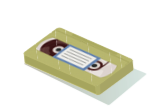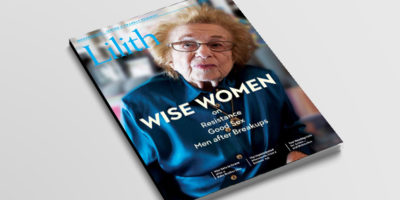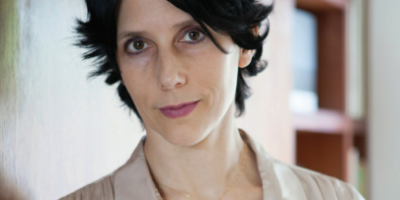
Erosion
OVER THE SUMMER of 2015 I worked at the Vancouver Holocaust Education Centre. Along with five other young women, I would come in each morning, put on my headphones, isolated, and watch witness testimonies for the entire day. Our job was to summarize them as accurately as possible, which meant watching the same testimonies two or three times each.
 Most of these testimonies were being viewed for the first time since the original interview, dug up from the archives and digitized off old VHS tapes after 30 years in the basement. Housewives in their 40s would buzz to life on our screens, smoking indoors in front of fake plastic scenery, adjusting enormous Chanel sunglasses over their emotions. They might speak first about their parents, their lineage, maybe the school they went to. Factual information to get off to an easy start. Born in the 1920s, a child in the early 30s. The horror begins in 1939 for most. No more stories of classroom bullies or anti-Semitic chants. Now there are beatings in the streets, police at the door, no more school, no more friends, no more work, no more shoes. In the time it takes to chain-smoke four cigarettes, we have passed through a ghetto and are packed into a train; we arrive at Auschwitz in the snow and the tape jams. The screen turns to rigid bars of color for camcorder white balance and I’m brought out of the story for four long seconds. I remember where I am and that there are four other transcribers in the room with me, each staring, fixated, listening to a different tape. My own video staggers back into focus and the Chanel sunglasses have been pushed aside, no escaping what comes next. The second hour of the interview is dedicated to the camps, the most difficult to listen to. The horror of the Holocaust is magnified by a single perspective; a string of sentences trying to build for me a bridge of mutual understanding. But this is something I can’t access, a vocabulary of English words that I know but ultimately mean nothing. To conceive of starvation and torture is like imagining the bottom of the ocean. I cling to what negligible hints my life can provide and I fail, miserably, to form even the murkiest picture.
Most of these testimonies were being viewed for the first time since the original interview, dug up from the archives and digitized off old VHS tapes after 30 years in the basement. Housewives in their 40s would buzz to life on our screens, smoking indoors in front of fake plastic scenery, adjusting enormous Chanel sunglasses over their emotions. They might speak first about their parents, their lineage, maybe the school they went to. Factual information to get off to an easy start. Born in the 1920s, a child in the early 30s. The horror begins in 1939 for most. No more stories of classroom bullies or anti-Semitic chants. Now there are beatings in the streets, police at the door, no more school, no more friends, no more work, no more shoes. In the time it takes to chain-smoke four cigarettes, we have passed through a ghetto and are packed into a train; we arrive at Auschwitz in the snow and the tape jams. The screen turns to rigid bars of color for camcorder white balance and I’m brought out of the story for four long seconds. I remember where I am and that there are four other transcribers in the room with me, each staring, fixated, listening to a different tape. My own video staggers back into focus and the Chanel sunglasses have been pushed aside, no escaping what comes next. The second hour of the interview is dedicated to the camps, the most difficult to listen to. The horror of the Holocaust is magnified by a single perspective; a string of sentences trying to build for me a bridge of mutual understanding. But this is something I can’t access, a vocabulary of English words that I know but ultimately mean nothing. To conceive of starvation and torture is like imagining the bottom of the ocean. I cling to what negligible hints my life can provide and I fail, miserably, to form even the murkiest picture.
Survivors have a tendency to skim over the anti-Semitism that colored their childhood before Hitler. The normalcy of small hatred. Remarks were made and life went on. The occasional violence was expected. Survivors fast-forward to the yellow stars and the riots; where they were when the Nazis marched down their main roads. “And then my troubles began,” they will say, chuckling through the irony. The swift integration of Nazi culture and laws like the crack of a whip overhead might have stirred up an anarchic frenzy had it not been for the already festering appeal of anti-Semitism. The lull of it. So many child survivors describe this particular scene: parents huddled over the kitchen sink, a fiercely high-stakes argument in whispers. Should they abandon this place that hates them; three hundred years on the family farm?
Each testimony comes from a local survivor. Over lunch one gentleman comes in to meet us, a smiling cookie-bearing man in his 80s. He looks me in the eye through cataracts and tells me I should go to law school. I go back to work and back in time; listen to a younger version of that same man speak about the methodical murder of his entire family. The first and last time he will ever tell it.
One transcriber gave up a month into our contract. She would come into work every morning and put on her headphones like everyone else, she might even log into our shared server and stare at the list of testimonies to do. Every night new testimonies were rendered and added to our list, so that it was always bigger, almost double what was left from the day before. Eventually she would navigate away from the list and onto YouTube, where she could stream bootleg Nazi Hunters for the rest of the day. Our bosses knew she was doing this, but they must have understood the toll this work would take.
A specialist in generational trauma was brought in to help dissect our reactions. We rolled our ergonomic chairs into a circle and divulged the extent of our damaged subconscious.
“I saw a man on the bus after work one night with a swastika tattooed under his ear,” said one colleague, and our little circle went still. “I wanted to say something, but I couldn’t breathe. I got home, and I couldn’t look at my husband. He knew something had happened, but I couldn’t talk about it.” The specialist nodded and asked, “how do you deal with those feelings?” And my colleague admitted, “I don’t take the bus anymore.”
When the program to preserve testimonies on video began in the late 80s, nobody knew whether the tapes would be useful 30 years down the road. There was a good chance that a basement full of recorded memories might be rendered useless by yet another sudden shift in popular technology. It was purely by coincidence that they chose VHS over the now-obsolete Betamax or 8” floppy. Still, the technology isn’t perfect. Most of these recordings have survived long enough to be digitized, but when we load up these old memories there are moments of magnetic failure, where a cassette’s estimated 20-year lifespan is pushing 30. The tape will skid over a 10-minute section, utterly indecipherable, and a chunk of history is lost forever. I was perversely relieved by these small lapses in testimony. A lost section might contain the worst of all memories, it could be the section that breaks you and sends you home.
THOUGH THE TRAUMA isn’t mine, I could no longer remember who I was. I had listened to 120 hours of witness testimony. Maybe more. Every aspect of my own life had been eclipsed by a few dozen traumas, the worst things you can imagine. After my contract ended, I went on a 900-mile hike across France and Spain—a trip that would keep me away from civilization.
Chloe Rose is a graduate of the BFA Creative Writing program at the University of British Columbia. A freelance journalist, she has written for Macleans, the Walrus, The American Pilgrims Association and is currently interning at Haaretz in Tel Aviv.



